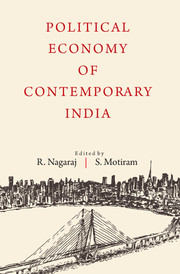Book contents
- Frontmatter
- Contents
- List of Tables and Maps
- List of Figures and Pictures
- Preface
- 1 Introduction: From ‘Intermediate Regime’ to Crony Capitalism
- Economy-wide Considerations
- 2 The Relationship between the Reserve Bank and the Government of India: Political Economy of Central Banking in India
- 3 The Limits of Liberalization: The Power Sector
- Political Economy by Regions of India
- Urban Labour Markets
- Land and Rural Labour
- About the Contributors
- Index
3 - The Limits of Liberalization: The Power Sector
from Economy-wide Considerations
Published online by Cambridge University Press: 08 February 2018
- Frontmatter
- Contents
- List of Tables and Maps
- List of Figures and Pictures
- Preface
- 1 Introduction: From ‘Intermediate Regime’ to Crony Capitalism
- Economy-wide Considerations
- 2 The Relationship between the Reserve Bank and the Government of India: Political Economy of Central Banking in India
- 3 The Limits of Liberalization: The Power Sector
- Political Economy by Regions of India
- Urban Labour Markets
- Land and Rural Labour
- About the Contributors
- Index
Summary
Introduction
Alongside capital, land, and labour, energy – and especially electricity – is the key input for contemporary capital accumulation. Electricity is fundamental to distributive conflicts and the politics of natural resource mobilization. It has also been inextricably bound up with the Indian state project and regional modes of governance for over a century (Kale, 2014b). Reflecting this importance, power was the first major sector opened to private investors in 1991. Since then it has witnessed almost a quarter-century of institutional restructuring to recalibrate the state's role. By 2014, it was taken to provide evidence of both catchphrases of the general election, ‘crony capitalism’ and ‘policy paralysis’. For all these reasons, Arvind Subramanian (2012) compared it to the Dandi Salt March of 1930: ‘Is power, or rather the power sector, today's salt – emblematic of both the pessimistic outlook and promise of India?’
The power sector therefore provides a crucial lens on Indian political economy. This chapter assesses the light that developments in the sector cast on contemporary Indian political economy from two related angles: the changing balance of power between dominant socioeconomic groups and the country's distinctive trajectory of institutional change as it has been shaped by these constraints. It shows that power sector evidence unsettles two key analytical frames that are commonly applied to liberalization-era India.
First, and most obviously, the sector's continually poor performance casts doubt on the extent of the state's ‘pro-business tilt’, seen by many as the hallmark of the era of economic reforms from the 1980s onwards. A survey of contemporary power subsidies for consumers and producers instead reveals an admixture of continuity and change in India's ‘basic political equilibrium’ (Bardhan, 1998). Despite almost a quarter-century of putative liberalization, in many States consumer-side electricity subsidies persist, most notoriously those which go to wealthy farmers. Meanwhile, poor-quality supply continues to damage industrial and commercial interests, aside from a narrow subset of well-connected energy producers. This pattern of subsidies and rents suggests that the pro-business tilt has in practice been limited, painful, and regionally uneven.
Second, this persistent inter-elite competition has fostered a distinctive dynamic of institutional change in the sector, a dynamic which troubles conventional accounts of liberalization as a single global process of displacing the statist system. The process of reform has instead been accretive, quite different to the institutional displacement that is associated with the archetypical, Anglo-American mode of ‘deregulatory’ liberalization.
- Type
- Chapter
- Information
- Political Economy of Contemporary India , pp. 52 - 74Publisher: Cambridge University PressPrint publication year: 2016

